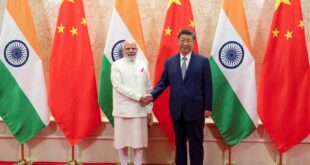The defense industry spent $56,272,948 to influence Washington last year, but they weren’t the only ones urging Congress and Obama for more war.
The defense industry spent millions lobbying the federal government last year, but they weren’t the only ones urging the country toward more war. Countries like Israel and Saudi Arabia, and even oil and computer industry representatives, also got in on the act.
According to OpenSecrets, a project of the Center for Responsive Politics, the defense and aerospace industriesspent a combined total of $56,272,948 on D.C. lobbying efforts last year. That’s down from the all-time high in 2013, when the industry spent over $78 million on lobbying.
In all, the defense industry employed 376 lobbyists on behalf of 42 clients, with 249 of those lobbyists, or about 66 percent, considered “revolvers” by OpenSecrets.org — lobbyists that were formerly employed in the defense industry and able to potentially use their insider knowledge and connections for more influence.
However, when it came to influencing Congress over defense-related issues, lobbyists came from a wide variety of industries, everything from technology to healthcare, with 1,086 clients getting involved in military topics. With computers becoming a key part of modern warfare, OpenSecrets even noted lobbying visits on behalf of corporations like Oracle Corp. and supercomputer maker Cray Inc. Medical industry corporations like UnitedHealth Group got involved, too.
Spending by the defense industry was dwarfed by the amount spent on behalf of the oil and gas industry, which invested over $97 million in lobbying in 2015. This industry, and its 762 lobbyists, are also involved in the endless march to war in America. Memos leaked in 2011 show how oil firms directly supported the war in Iraq. Even after many U.S. troops left the country in 2012, the oil industry stayed behind, with BP and Royal Dutch Shell earning billions from lucrative contracts in the Middle East. (Those same interests continue to this day: Even the Syrian civil war and the resulting refugee crisis are fueled by competing oil pipelines.)
Foreign nations also joined in lobbying for war during 2015. The American Israel Public Affairs Committee, the extremely influential pro-Israel lobbying group also known as AIPAC, formed a special advocacy group with other Zionist organizations, Citizens Against a Nuclear Iran, just to support the unsuccessful attempt to sink the nuclear deal, according to a June 23 report from Bloomberg View’s Eli Lake:
“[M]ajor donors to AIPAC and other pro-Israel causes are forming a new and independent 501(c)(4) advocacy organization, according to fundraisers and other lobbyists involved in the effort. The new organization will buy TV, radio and Internet ads targeting lawmakers from both parties who are on the fence about the nuclear deal, these sources say.”
William Roberts, writing for Al-Jazeera in August, reported that AIPAC had spent $20 million on their combined TV and social media campaign to discourage peace with Iran.
In October, Lee Fang, a journalist for The Intercept, reported on Saudi Arabia’s Washington lobbyist “hiring spree,” with the oil-rich kingdom buying talented influencers from throughout the nation’s capitol:
“In September alone, foreign lobbying disclosure documents show the Saudi government signing deals with PR powerhouse Edelman and lobbying leviathan the Podesta Group, according to recent disclosures.
… In March, the Saudi Royal Embassy retained two influential lobbying firms,DLA Piper and Pillsbury Winthrop Shaw Pittman. DLA Piper, for instance, employs a small army of former government officials, including retired U.S. Sens. Saxby Chambliss and George Mitchell. Also in March, the embassy retained two firms that specialize in analyzing big data for political clients, Targeted Victory and Zignal Labs.”
While Fang noted that the Saudi royal family sought to insulate itself from human rights abuses like theexecution of dissidents such as Sheikh Nimr al-Nimr, they also needed to bolster support and foreign aid for the savage U.S.-backed assault on Yemen. He explained:
“The nation also faces international outcry over the widespread killing of civilians in Yemen. Since March, Saudi Arabia has led a coalition that includes the U.S., U.K., Egypt and several Persian Gulf nations to support the Yemeni government in its war against the Houthi rebels. The Saudi-led coalition has repeatedly attacked schools, hospitals, and other civilian targets, including recent reports of a wedding party that was bombed, killing over 100 people.”
 Geostrategic Media Political Commentary, Analysis, Security, Defense
Geostrategic Media Political Commentary, Analysis, Security, Defense





